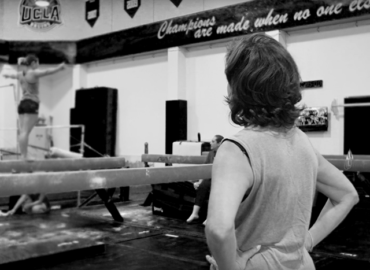Bullish Leadership is Dead
I’ve talked about the book “Mindset” by Dr. Carol Dweck in which she discusses the difference between a fixed and growth mindset. I definitely enjoy a growth mindset and look forward to seeking out something new on a daily basis that makes me take pause and go “hmmmmm.”
One of my most recent “hmmmm’s” that I’ve thought about is something Dr. Dave Tilly said in his presentation at GymCon. He was discussing overtraining issues and how coaches are looking to physical therapy treatments, such as rolling out on a foam roller, to combat the real issue which is overuse. He asked the question to a room full of coaches, “Are you seeking technical solutions for a cultural problem?” In this case, the technical solutions is physical therapy treatment for the athlete who is doing too many numbers of a skill and causing the overuse injury.
I most recently used this analogy in a speech I was giving about how to combat abusive working environments. I credited Dr. Dave with his scenario then posed the question to the leaders in the audience, “Are you using bullish solutions for a cultural problem?” Meaning, as a leader are you resorting to yelling, demeaning, or insulting language to try to motivate your team to perform better? When you should instead look at why they aren’t performing at a level of excellence in the first place?
This gets back to my definition of a coach, to motivate change, which translates to anyone in a leadership position. A bullish abusive leadership style doesn’t motivate it intimidates; and at best dictates change and at worse produces change through fear.
Whether you are coaching athletes or leading your business constituents in fundraising efforts, a political campaign, or small business endeavor, it has been proven through practical observation and research analysis that people perform at their best when they are properly prepared and encouraged to execute at a level of excellence through positive supportive reinforcement. The tide is shifting from the days of thinking of positive coaching as “soft” and “warm and fuzzy.” Actually, the time has shifted.
Phil Jackson won 11 NBA Championships. The majority of them coming after he embraced and offered mindfulness training and meditation for his players as part of their daily practice. The Cubs manager, Joe Maddon, instituted a mental skills program at the start of his first season with the club in 2015. The following season the Cubs won their first World Series title in over a century. And most recently our UCLA Gymnastics team proved once again that you can win with a strategic plan, thoughtful preparation and a lot of fun. This actually all comes down to a high level of L.Q.—the importance of the Love Quotient. Love for the game, Love for opportunity to play the game, Love for each other and Self-Love.
In any quest for a goal there are always multiple ways to get there. Considering that none of us are guaranteed tomorrow, I would hate to go even one day not including a high level of love and appreciation for the process, and the people I’m working with through the process. After all, at the end of our days we are remembered for how we’ve made people feel not the accolades we’ve achieved along the way.
There is a great article in the Spring 2018 edition of Technique magazine by Lainy Carslaw entitled “The Benefits of Positive Coaching.” She offers clear practical examples of how to build positive cultures in gyms.
If you are prone to lead by bullying, embarrassing, belittling, or intimidating I encourage you to answer this simple question, “Is your bullish style of coaching really going to help that person perform to their best or is it really just about you needing to blow off steam?” Moreover, consider that there is not one study that supports that bullish/abusive behavior is more successful than a positive coaching model. If you really want to take your athletes or fellow employees from good to exceptional I suggest giving your ego a time out (as I remind myself to do all the time), hit the refresh button on your goals, trust the research and honor your position of authority by leading from a place of positivity, appreciation, enthusiasm, support and love.










This reminds me so much of the young boys trapped in that cave in Thailand. The coach used to be a monk and I’m convinced it was his calmness & teaching the boys to meditate that saved their lives and enabled them to bounce back so quickly. Imagine being trapped in a pitch black cave with decreased oxygen, barely any food, dirty water, cold, and terrified. Now imagine trying to survive that with some jerk of a coach yelling and making the situation worse, and even more deadly. Somebody would have died. I’m not trying to be funny. At least… Read more »